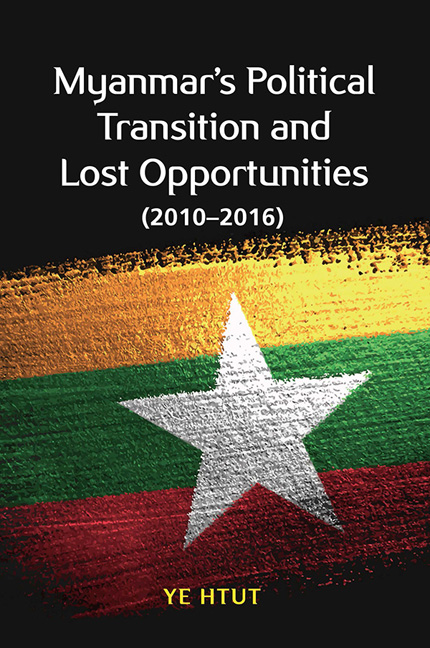Book contents
- Frontmatter
- Contents
- Foreword
- Acknowledgements
- Introduction: Myanmar's Political Reforms
- 1 The National Convention
- 2 The Constitution
- 3 The Union Solidarity and Development Party
- 4 Myanmar Spring and Aung San Suu Kyi
- 5 The Union Government
- 6 The Government and the Parliament
- 7 Shwe Mann's Checkmates
- 8 Turning Points
- 9 Media Reform
- Epilogue
- Appendix A President Thein Sein's Inaugural Address
- Appendix B President Thein Sein's First Address to the Cabinet
- List of Interviewees
- Index
- About the Author
- Plate section
Foreword
Published online by Cambridge University Press: 25 January 2020
- Frontmatter
- Contents
- Foreword
- Acknowledgements
- Introduction: Myanmar's Political Reforms
- 1 The National Convention
- 2 The Constitution
- 3 The Union Solidarity and Development Party
- 4 Myanmar Spring and Aung San Suu Kyi
- 5 The Union Government
- 6 The Government and the Parliament
- 7 Shwe Mann's Checkmates
- 8 Turning Points
- 9 Media Reform
- Epilogue
- Appendix A President Thein Sein's Inaugural Address
- Appendix B President Thein Sein's First Address to the Cabinet
- List of Interviewees
- Index
- About the Author
- Plate section
Summary
U Ye Htut has written a book of a very rare kind. Few accounts of the inside working of a government are available so soon after it has left office. Even fewer, indeed almost none, are written about the working of the government of Myanmar by an author who could be considered an “outside insider”. Ye Htut was not a key figure in the military government which preceded that of President Thein Sein in 2011. Having been an army officer on the cusp of becoming a colonel, he became a civil servant somewhat earlier in his career than many others would eventually become. Within the Thein Sein government he rose quickly, ultimately, in 2013, to the position of presidential spokesperson and then, the following year, minister for information. His talents and skills were clearly needed in Myanmar's transitional regime from military authoritarian to constitutional rule.
Moreover, Ye Htut's book is not merely his personal observations on the workings of the Thein Sein government from within. He has conducted extensive interviews with others more intimately involved in certain crucial decisions and events than himself, thus adding an additional dimension to his analysis. Many both inside and outside of Myanmar will be unaware of the crucial dynamics at work within the government for which he worked as a civil servant and ultimately as a minister. He was increasingly entrusted with greater responsibilities and increased inside knowledge because of not only his administrative competence but because of the high regard he was and is held as a result of his probity and open-mindedness.
Ye Htut's background is not unusual for someone of his age and position in Myanmar. Born in Yangon in 1959, his father, U Shwe Than, was a serving army officer and one of the earliest Myanmar graduates of the British Royal Military Academy Sandhurst. Shwe Than saw military service in various parts of Myanmar before being appointed first deputy head and then head of the police by General Ne Win in the 1970s. Subsequently, Ne Win moved Shwe Than to the headship of the country's national shipping company, then known as the Burma Five Star Line. Ye Htut, growing up in a military officer's home, could not be unaware of the intrigues that existed within the army and the army-dominated Burma Socialist Programme Party (BSPP) during his youth.
- Type
- Chapter
- Information
- Myanmar's Political Transition and Lost Opportunities (2010–2016) , pp. vii - xviiiPublisher: ISEAS–Yusof Ishak InstitutePrint publication year: 2019

